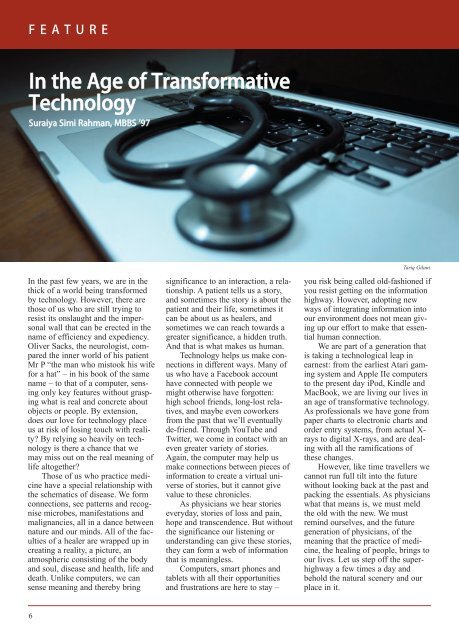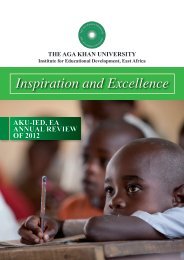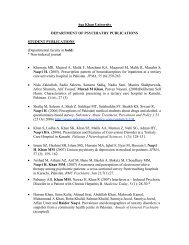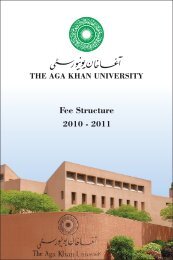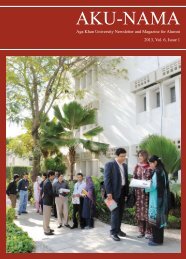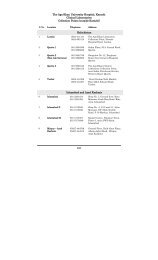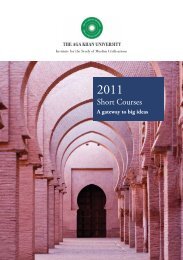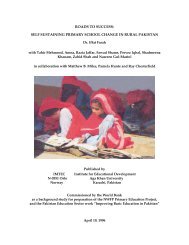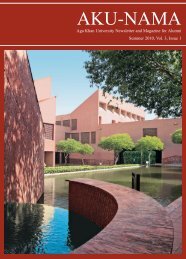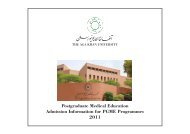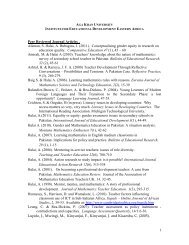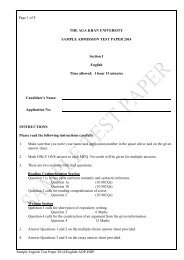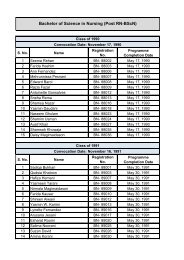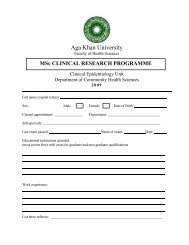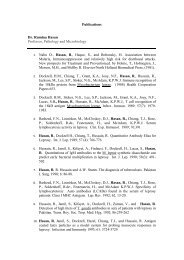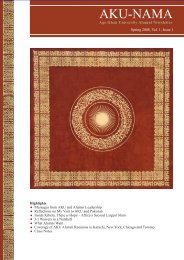Summer 2011, Vol. 4, Issue 1 - Aga Khan University
Summer 2011, Vol. 4, Issue 1 - Aga Khan University
Summer 2011, Vol. 4, Issue 1 - Aga Khan University
Create successful ePaper yourself
Turn your PDF publications into a flip-book with our unique Google optimized e-Paper software.
f e A t U r e<br />
in the Age of transformative<br />
technology<br />
suraiya simi rahman, mBBs ’97<br />
In the past few years, we are in the<br />
thick of a world being transformed<br />
by technology. However, there are<br />
those of us who are still trying to<br />
resist its onslaught and the impersonal<br />
wall that can be erected in the<br />
name of efficiency and expediency.<br />
Oliver Sacks, the neurologist, compared<br />
the inner world of his patient<br />
Mr P “the man who mistook his wife<br />
for a hat” – in his book of the same<br />
name – to that of a computer, sensing<br />
only key features without grasping<br />
what is real and concrete about<br />
objects or people. By extension,<br />
does our love for technology place<br />
us at risk of losing touch with reality?<br />
By relying so heavily on technology<br />
is there a chance that we<br />
may miss out on the real meaning of<br />
life altogether?<br />
Those of us who practice medicine<br />
have a special relationship with<br />
the schematics of disease. We form<br />
connections, see patterns and recognise<br />
microbes, manifestations and<br />
malignancies, all in a dance between<br />
nature and our minds. All of the faculties<br />
of a healer are wrapped up in<br />
creating a reality, a picture, an<br />
atmospheric consisting of the body<br />
and soul, disease and health, life and<br />
death. Unlike computers, we can<br />
sense meaning and thereby bring<br />
significance to an interaction, a relationship.<br />
A patient tells us a story,<br />
and sometimes the story is about the<br />
patient and their life, sometimes it<br />
can be about us as healers, and<br />
sometimes we can reach towards a<br />
greater significance, a hidden truth.<br />
And that is what makes us human.<br />
Technology helps us make connections<br />
in different ways. Many of<br />
us who have a Facebook account<br />
have connected with people we<br />
might otherwise have forgotten:<br />
high school friends, long-lost relatives,<br />
and maybe even coworkers<br />
from the past that we’ll eventually<br />
de-friend. Through YouTube and<br />
Twitter, we come in contact with an<br />
even greater variety of stories.<br />
<strong>Aga</strong>in, the computer may help us<br />
make connections between pieces of<br />
information to create a virtual universe<br />
of stories, but it cannot give<br />
value to these chronicles.<br />
As physicians we hear stories<br />
everyday, stories of loss and pain,<br />
hope and transcendence. But without<br />
the significance our listening or<br />
understanding can give these stories,<br />
they can form a web of information<br />
that is meaningless.<br />
Computers, smart phones and<br />
tablets with all their opportunities<br />
and frustrations are here to stay –<br />
Tariq Gilani<br />
you risk being called old-fashioned if<br />
you resist getting on the information<br />
highway. However, adopting new<br />
ways of integrating information into<br />
our environment does not mean giving<br />
up our effort to make that essential<br />
human connection.<br />
We are part of a generation that<br />
is taking a technological leap in<br />
earnest: from the earliest Atari gaming<br />
system and Apple IIe computers<br />
to the present day iPod, Kindle and<br />
MacBook, we are living our lives in<br />
an age of transformative technology.<br />
As professionals we have gone from<br />
paper charts to electronic charts and<br />
order entry systems, from actual X-<br />
rays to digital X-rays, and are dealing<br />
with all the ramifications of<br />
these changes.<br />
However, like time travellers we<br />
cannot run full tilt into the future<br />
without looking back at the past and<br />
packing the essentials. As physicians<br />
what that means is, we must meld<br />
the old with the new. We must<br />
remind ourselves, and the future<br />
generation of physicians, of the<br />
meaning that the practice of medicine,<br />
the healing of people, brings to<br />
our lives. Let us step off the superhighway<br />
a few times a day and<br />
behold the natural scenery and our<br />
place in it.<br />
6


